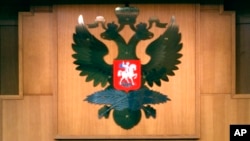MOSCOW —
Russia vowed on Wednesday to retaliate against what it called “unfounded” U.S. sanctions imposed a day earlier on 12 Russians for human rights abuses, including allegedly denying medical care to a whistleblowing lawyer who died in a Russian prison.
The United States did not link the sanctions - which expand a list of individuals targeted in 2012 over lawyer Sergei Magnitsky's death - to those imposed by Washington this year over Moscow's annexation of Crimea and unrest in eastern Ukraine.
The Russian Foreign Ministry did, however, accuse the United States of “double standards” for not speaking out about what it says are abuses by Ukrainian authorities in fighting pro-Russian separatists in the east of the country.
“We view the decision by the U.S. administration to impose visa and financial sanctions against 12 Russian citizens... as unfounded and dictated by a cynical desire to use human tragedy for unscrupulous political goals,” it said in a statement.
“The American side is trying to moralize by showing false concern for the fate of the late Sergei Magnitsky at a time when the U.S. proteges, the Kyiv authorities, are using force ... against the population in southeastern Ukraine.”
The statement highlighted the depth of the crisis in relations between the two former Cold War superpowers.
The interim Kyiv government's Western allies accuse Moscow of sowing rebellion in Ukraine and illegally annexing Crimea. Russia denies fomenting unrest, saying that popular uprisings are taking place against an illegitimate government installed in Kyiv through a coup.
Since 2012, the United States has accused a number of Russians of human rights abuses and sought to punish them by freezing their U.S. assets and barring them entry under a law named for Magnitsky, who had alleged major tax fraud by Russian officials.
The State Department has identified 18 Russians as subject to sanctions, but also imposed measures on other figures whose names have not been made public.
Magnitsky was last year convicted posthumously of tax evasion. Those placed on the sanctions list on Tuesday included prison doctors, the judge who oversaw his posthumous trial and a banker alleged to have masterminded the conspiracy he uncovered.
The United States did not link the sanctions - which expand a list of individuals targeted in 2012 over lawyer Sergei Magnitsky's death - to those imposed by Washington this year over Moscow's annexation of Crimea and unrest in eastern Ukraine.
The Russian Foreign Ministry did, however, accuse the United States of “double standards” for not speaking out about what it says are abuses by Ukrainian authorities in fighting pro-Russian separatists in the east of the country.
“We view the decision by the U.S. administration to impose visa and financial sanctions against 12 Russian citizens... as unfounded and dictated by a cynical desire to use human tragedy for unscrupulous political goals,” it said in a statement.
“The American side is trying to moralize by showing false concern for the fate of the late Sergei Magnitsky at a time when the U.S. proteges, the Kyiv authorities, are using force ... against the population in southeastern Ukraine.”
The statement highlighted the depth of the crisis in relations between the two former Cold War superpowers.
The interim Kyiv government's Western allies accuse Moscow of sowing rebellion in Ukraine and illegally annexing Crimea. Russia denies fomenting unrest, saying that popular uprisings are taking place against an illegitimate government installed in Kyiv through a coup.
Since 2012, the United States has accused a number of Russians of human rights abuses and sought to punish them by freezing their U.S. assets and barring them entry under a law named for Magnitsky, who had alleged major tax fraud by Russian officials.
The State Department has identified 18 Russians as subject to sanctions, but also imposed measures on other figures whose names have not been made public.
Magnitsky was last year convicted posthumously of tax evasion. Those placed on the sanctions list on Tuesday included prison doctors, the judge who oversaw his posthumous trial and a banker alleged to have masterminded the conspiracy he uncovered.





